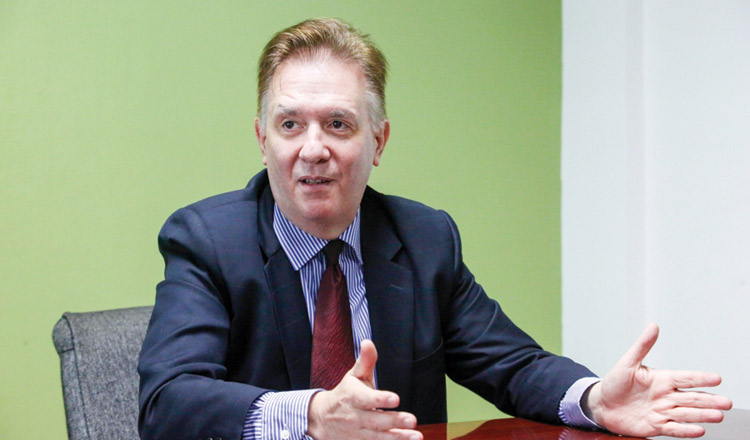The dust had barely settled when the Cambodian government, revelling in its majority win for a renewed mandate, felt the blow from the European Union over its alleged general election manouvre to oust its opposition.
For the latest Cambodian Business news, visit Khmer Times Business
The withdrawal process of the Everything But Arms (EBA) preferential treatment, related to the alleged non-democratic election move, and later the removal of the safeguard measures on its rice export, has kicked up some food for thought.
The unitary-state Cambodian government led by Prime Minister Hun Sen and his Cambodian People’s Party (CPP), in power since 1998 might remain gallant over the entire process and the economy but for how long?
The nation made some difficult decisions recently including amending a law to allow the return of barred opposition members to politics, and simplifying export processes to reduce operation costs, to the detriment of the government’s coffers, in response to EU’s action.
But these are just knee-jerk reactions, seemingly superficial moves to smoothen creases rather than overhaul the system, fraught with bad governance, a complacent mindset, and corruption.
“Cambodia is facing mounting challenges in terms of economic reforms and diversification, and lack of political leadership and institutional capacity has constrained its development potential,” says public policy analyst Vannarith Chheang.
Economic diversification is instrumental to save Cambodia’s future in the post-EBA era and looming economic sanctions from the US.
“Some senior leaders are not adaptive enough to changes and are rather conservative when it comes to institutional reforms. Some hold the belief that if there is nothing is wrong, there is no need to fix,” Vannarith, president for think-tank Asian Vision Institute, tells Capital Cambodia via email.
The country needs to have an independent assessment and monitoring mechanism to evaluate the performance of each government ministry and state agency.
“Otherwise, the leaders are not fully aware of the symptoms and problems that each ministry and agency is facing. Accepting the hard truth is critical in delivering reform outcomes,” Vannarith says.
This is not a unique phenomenon. What Cambodia faces is symptomatic of fundamental problems inherent in governments that have been in power for long periods.
Its level of competitiveness has progressively dropped over the years, settling at the 110th spot, according to World Economic Forum’s global competitiveness report last year.
However, this is only seen as a blip as the government feels investors rely on their own studies and judgments when making decisions.
The buoyance is also fed by growing Chinese investment that has risen to $6.3 billion in 2017, making it the largest investor six years straight as trade between Cambodia and China climbed 21 percent year-on-year to $5 billion.
This might be good but in the long run with the loss of EBA and the risk of other generalised scheme of preferences (GSPs) being pulled, Cambodia needs to be forceful with its Rectangular Strategies and Industrial Development Policy if it wants to be an upper middle-income nation by 2030 and higher income nation by 2050.
Asian Development Bank lead economist on trade and regional cooperation Jayant Menon says Cambodia should continue its open and outward-looking trade policy stance while pursuing trade deals with key partners if it is of net benefit to the Kingdom.
“Many trade deals now also deal with foreign direct investment (FDI) flows but Cambodia needs to improve its screening of FDI proposals to ensure that it is able to absorb the huge volumes coming in, and that they comply with the government’s national objective,” he adds.
Having said that, Dee Wee Management Consultants managing director David Van opines that building a relationship with sophisticated markets like China or European countries could require high compliance.
“For instance, the Cambodian civil service is inflated and it is beholden to the party. It should be reduced to a solid number that is competent in order to do the job in a short span of time.
“This makes bilateral or multilateral deals tricky because there are compromises to be made. Negotiations should be done competently. You don’t need to have a minister who knows the subject but one who has a vision,” Van adds.
The Cambodian constitution states that civil servants cannot be fired but in France, the government plans to lay off 120,000 civil servants in four years to reduce its operating budget.
To Vannarith, Cambodia needs a transformative leadership that can bring positive changes, and that grassroots leaders need to be acknowledged and empowered.
Elitist politics and leadership have proven not so effective in winning people’s heart and gaining public trust in the state institutions.

“Down-to-earth type of leadership is more effective. Changing social mindsets and values requires time. However, Cambodia can no longer enjoy the luxury of time anymore. It is urgent to speed up reforms before it is too late,” he adds.
Reforms and strategies aside, for Cambodia to be at the forefront of the business world, corruption needs to be battled.
According to corporations, palm greasing here is allegedly the norm at every level of government agencies.
Cambodia was ranked 161 out of 181 countries in Transparency International’s global corruption index in 2017.
Corruption permeates every aspect of the Cambodian social fabric with the elite monopolising procurement, land concessions and access to resources through the establishment of patron-client networks, a 2016 TI report notes.
It says despite a relatively good anti-corruption law that came into full force in 2011, implementation has been weak and corrupt entities continue to function with impunity.
Corruption has been the main governance issue in Cambodia, like a cancer that requires serious treatment, Vannarith says, adding that, “X-rays and surgeries need to be done on the affected parts of the body”.
Cambodian Investment Management chief executive officer Anthony Galliano disagrees, saying that the country gets an unfair raw deal in its ranking in the world corruption ranking.
“The world had its fair share of recent massive corruption scandals, particularly Malaysia’s 1Malaysia Development Bhd, Brazil’s ‘Car Wash’, and the claim that Mexico’s former president received a $100 million bribe from a drug cartel, for example.
“Despite the mammoth scandals, these countries are ranked better than Cambodia. The country has its fair share of corruption problems but to continually rank the country so poorly in the face of continual massive global corruption scandals, usually involving governments, leads me to the conclusion the ranking is flawed,” he says via email.
Nonetheless, Galliano says businesses would commend efforts to curtail systemic corruption because not doing so raises the cost of doing business in the country as they interface with government agencies regularly.
“It would greatly improve the Kingdom’s competitiveness if efforts were made to lessen the long cycle time to get permits and licenses, and reduce the costs in approval,” he adds.
With everything said and done, Cambodia could undoubtedly do better if there is fresh blood to steer the country ahead.
Van says it all boils down to meritocracy in the government sector, noting that there are many youngsters who are good but suppressed, not empowered.
Continuous suppression might result in them leaving or becoming demoralised, leading to sufferance in the civil service.
“Perhaps we need to take out the veterans, only then the younger generation can move to the driver seat. At present, they are not even co-pilots. They are probably seated five rows behind,” he says.
Politics is all about convenience and expediency. It never disturbs the status quo. CapCam
Sangeetha Amarthalingam
Assistant Editor, Capital Cambodia




